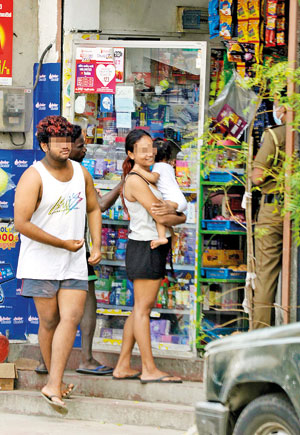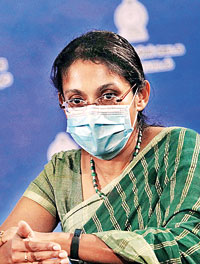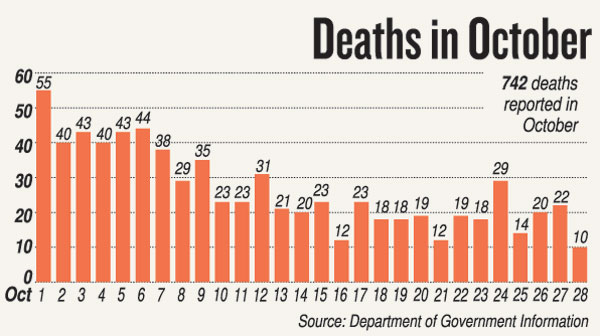News
‘Living with COVID-19 is not forgetting about the virus’
A look around at what is happening and then a closer look at the latest virus variants as well as studies on the different vaccines.
This is the wide-ranging interview the Sunday Times has with Prof. Neelika Malavige, Head of the Department of Immunology and Molecular Medicine, University of Sri Jayewardenepura.
Pointing out that the current pandemic situation in Sri Lanka is under control (reduced infections and reduced deaths), she asks: Should we be complacent and throw caution to the winds?

Throwing caution to the winds: A masked policeman appears to be turning a blind eye to these people not wearing masks. Pic by Indika Handuwala
“No,” she says emphatically, for the pandemic is not over yet. Everyone is trying very hard to end the pandemic but it is still going on, closing in on nearly two years. Even New Zealand which had a ‘strategy of elimination’ has had to come to terms with the reality that we may not be able to get rid of the virus. Therefore, until the pandemic ends, we need to take many measures to make sure it will not escalate and cause havoc as it has done before. “We cannot afford to go back to that situation.”
Prof. Malavige looks at malaria and dengue, which Sri Lankans are acutely familiar with and then at the SARS-CoV-2 virus.
She says: “Our parents scrupulously slept under mosquito nets and we did too because bitter were the lessons of malaria. Those days, when we were children, no one thought of dengue and no one looked for dengue mosquito breeding sites. We had lots of trees in our gardens and there would have also been stuff collecting water such as coconut shells, tyres, etc. We didn’t look for breeding sites actively those days.
“But now we do – we actively look for such sites not only in our gardens but also inside our homes to prevent the spread of dengue but now our children will not sleep under a mosquito net because malaria is not a threat anymore. Now there has been a major behavioural change among people with regard to dengue.”
Referring to dengue, she says that a certain number of people get this disease every year and some of them need hospital admission. Sri Lanka cannot get rid of dengue because it is endemic. It is there all the time and if people are lax and allow breeding sites to proliferate, there follows a larger outbreak or an epidemic like what happened in 2017. These are the spikes the country is trying to prevent with dengue.
Similarly, until COVID-19 ceases to be a threat, Sri Lanka will have to ensure that we continue to wear masks, focus on ventilation, reduce indoor gatherings and have virtual meetings/working from home whenever and wherever possible, points out Prof. Malavige.
Turning her focus on COVID-19, she says that once we control the pandemic, this viral disease would also become endemic like dengue, with prevention and control strongly geared towards curbing epidemics. However, it is important to remember that the pandemic has not ended yet. Thus, all efforts should be directed to end it.
She brings in a cautionary note to explain that “when we say that we are living with COVID-19, it should not mean that we are ‘forgetting’ about it. We have to be on full alert and watch every single step”.
How should Sri Lanka be on full alert, she asks, showing the time-tested ways it can be done:
The surveillance for Influenza-Like Illness (ILI) and Severe Acute Respiratory Infection (SARI) should be carried out diligently as these would light up the danger signals immediately about more virulent COVID-19 variants which could set off a huge wave of infections.
Active and systematic’ sequencing of viruses is a must with samples from “all” over the country. We have to be watchful because we have to live with the viruses.
Control and preventive measures should not only be implemented but also adhered to, by the authorities and the people.
A few of the other changes we need with regard to facing the challenges of COVID-19 are:
Keeping our face masks on whenever we are indoors or in an enclosed space, away from home.
Better ventilation wherever we are. We are not in a country affected by winter. So even if we visit someone’s home, we can sit in the verandah or if we are inside, open all the windows and doors so that the air flows through. When taking a meal, that’s the time we remove our masks, we can sit outside.
The same policy can be followed in offices – throwing open doors and windows.
Luckily, many of Sri Lanka’s hospitals and schools have half walls. Teachers could also conduct lessons out in the garden under a tree if it is not raining.
Prof. Malavige keeps underscoring the vital need to be masked. Obviously, vaccines play a huge role in reducing disease severity and death as well as significantly reducing transmission. But vaccines alone will not prevent infection. Many countries, for instance, such as the United Kingdom (UK) which has vaccinated a large proportion of their populations are now experiencing large outbreaks. This is because they do not focus that much on wearing masks indoors.
| Vaccine studies Prof. Neelika Malavige and her team have carried out several vaccine studies, not only to see how well there is immunity in those vaccinated but also how long such immunity persists. “Sri Lanka is one of those rare countries where most of the WHO-approved vaccines are being administered. Therefore, we are able to conduct head-to-head comparisons among the vaccines as well as with studies carried out in other countries,” she says. Here are Prof. Malavige’s findings from these ongoing studies: AstraZeneca vaccine – The data after three months of receiving the 2nd dose show a “very good” antibody and T-cell response which had not declined by three months after the 2nd dose. Sinopharm vaccine – The data after three months of receiving the 2nd dose show a waning in the antibody levels of a “significant” proportion of people, especially the elderly. Although the antibodies are on the decline, there seems to be a persistent T cell response. Antibodies prevent the person getting the infection and T cells are the most important thing in preventing severe infection. Moderna vaccine – The three months after the 2nd dose would come around next week. Sputnik V vaccine – Studies are underway. She explains that the WHO has recommended a 3rd dose/booster dose between three to six months for those over 60 years of age who have received the Sinopharm vaccine. This is not surprising because if other inactivated vaccines like polio are considered, two or three doses are given after the initial one. “Considering that the elderly may have poor immune responses to vaccines, other countries have also recommended that the elderly who have received Pfizer or AstraZeneca should be given a booster after six months,” adds Prof. Malavige. | |
|
 Prof. Neelika Malavige Rare honour for Prof. Malavige Prof. Neelika Malavige has got the rare honour of being handpicked to be among 10 renowned experts on the Technical Advisory Group (TAG) to advise on scientific, technical and strategic matters related to the COVID-19 Technology Access Pool (C-TAP), established by the WHO. The experts have a diverse range of knowledge and the C-TAP Secretariat aims to facilitate timely, equitable and affordable access of COVID-19 health products by boosting their supply. WHO C-TAP implementing partners include the Medicines Patent Pool, Open COVID Pledge, UN Technology Bank and Unitaid. While many TAG members are from the United States of America, the others are from South Africa, Brazil and Netherlands.
|
SL’s very own Delta sub-lineage found
“Sri Lanka has its very own Delta sub-lineage (AY.28), sequencing has found,” confirms Prof. Neelika Malavige, pointing out that samples are to be sent this week to the Hong Kong (HK) laboratory of Prof. Malik Peiris for further studies.
The samples are being sent out after all authorizations have been obtained because Sri Lanka has no facilities for Biosafety Level 3 for such studies done by growing the virus, she says.
Prof. Peiris is the Professor of Virology at the School of Public Health, HK University.
Prof. Malavige says that the Delta sub-lineage initially detected in May mainly in the Western Province but not in places like Jaffna could be associated with higher transmissibility, which is currently being investigated. At the height of the epidemic, about 60-70% of the infections in Colombo were because of this sub-lineage, which has now reduced to 49%. 
The studies are hoping to establish whether this sub-lineage is actually associated with a higher transmissibility than the original Delta variant. It would usually take around a month to get the initial results, she adds.

